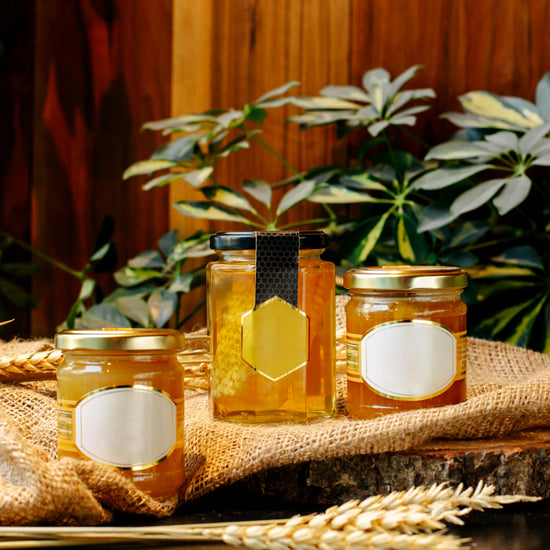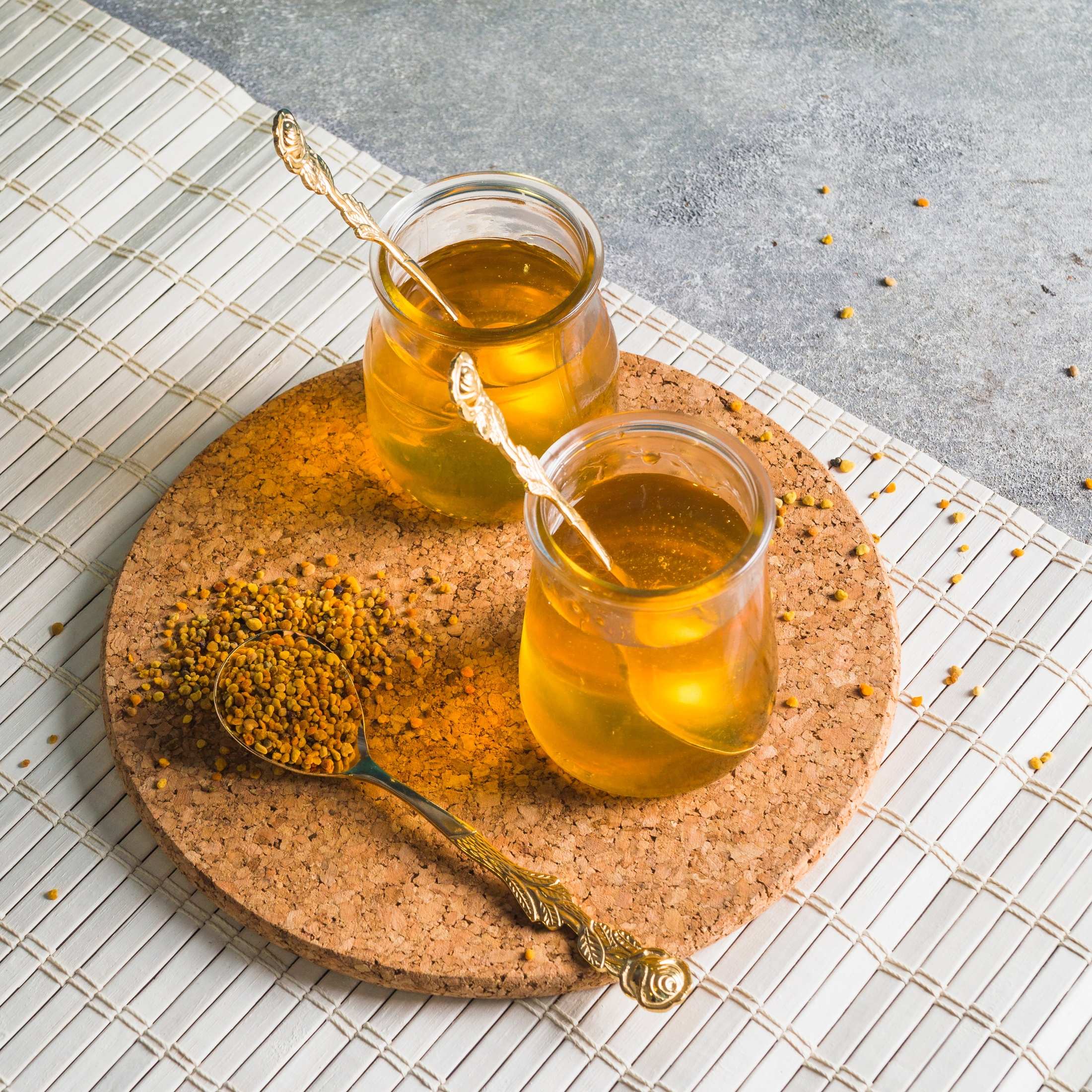Acacia Honey: Benefits, Risks and Uses


Its excellent clarity and lower rate of crystallisation make it one of the best honey available in the market.
It is sold with the 'acacia honey' label in the UK and with the 'locust honey' label in the United States. In contrast to the traditional honey, it is very transparent and has a lighter consistency.

It has a delicate, sweet flavour and a flower-like aroma. Due to a higher fructose content, acacia crystallises very slowly and remains liquid for longer. It freezes at very low temperatures (-4°F (-20°C)). Due to these factors, it is expensive and more popular than traditional honey.
One tablespoon (21g) of acacia honey has 17g of sugar and 60 calories. The complete nutritional profile is as follows;
|
Acacia honey: Nutritional facts (per 100g) (Source: USDA) |
|
|
Energy |
286 |
|
Total lipids |
0 |
|
Total sugars |
81 |
|
Protein |
0 |
|
Sodium |
0 |
|
Fatty acids |
0 |
The sugars present are glucose, fructose and sucrose, the fructose being the most abundant. It has a small amount of minerals, particularly magnesium, zinc & iron and vitamins, particularly vitamin C, but lacks fibre, fats and proteins.
The most critical and pharmacologically active ingredients are flavonoids, luteolin and quercetin. These are potent antioxidants and are responsible for most of the health benefits.
Acacia honey isn't just delicious; it boosts a wealth of healthy nutrients. From its divine taste to its therapeutic wonders, each spoonful is a journey into sweetness and well-being. The scientifically proven health benefits are;
Most of the healing properties of Acacia honey are attributed to the presence of antibacterial compounds particularly phenols, hydrogen peroxide (H2O2) and glucose oxidase (GOX) enzymes. These components cause a slow and sustained release of hydrogen peroxide that kills the germs by damaging their cell membranes.
The antibacterial properties of honey are well researched. According to a study published by Professor Marcela Bucekova and colleagues in 2019, the antibacterial properties of acacia honeys against Pseudomonas aeruginosa and Staphylococcus aureus was superior to rapeseed honeys, but inferior to the wildflower honeys.
In an in vitro experiment, Walid Sabri and colleagues reported that acacia honey (AH) produced a significant inhibition zone against Staphylococcus epidermidis, Escherichia coli and Staphylococcus aureus.
Acacia honey has flavonoid antioxidants that protect the cells from the damage caused by free radicals, the primary cause of diseases. In in vitro studies, these antioxidants show anti-free-radical, anticancer and antimicrobial properties.
It has a small amount of beta-carotene, a plant pigment with antioxidant properties. Eating foods containing beta carotene is linked to better skin health, brain functions and a lower risk of cervical, lung, oral cavity and pharyngeal cancers.
Many commercial anti acne lotions and creams containing a mixture of acidic ingredients and acacia honey are available in the market. There is, however, little evidence that direct application of acacia honey on the skin has anti-acne effects. Its antibacterial promises to kill the germs responsible for severe acne breakouts. More research is needed to explore the potential of acacia honey to treat acne.

Honey is highly suitable as a dressing for burns and wounds, and dermatologists recommend honey-based dressings for the treatment of psoriasis, diaper dermatitis, dandruff, seborrhea and haemorrhoids. It prevents skin infections, regulates pH, reduces skin wrinkles and rejuvenates the skin. Some honey-based cosmetic products are conditioners, shampoos, tonic lotions, hydrating creams, cleansing milk and lip ointments and have between 1-10% honey contents.
The use of acacia honey to hasten wound healing is an old tradition. It has antibacterial and antioxidant properties that hasten wound healing by preventing bacterial infections and contamination. It provides a protective barrier to the skin and helps keep the wounds moist, which helps in wound healing.
According to Hanaa Tashkandi, working at (King Abdulaziz University, Saudi Arabia), honey is an effective and safe natural alternative to antimicrobial agents. It is effective for a broad range of wound types, e.g., burns, diabetic boils, fistulas, leprosy, malignancies, traumatic boils, leg ulcers, amputations, varicose and cervical ulcers, cracked nipples, surgical wounds and wounds in the abdominal wall.
One of the significant reasons suggested for the use of acacia honey is its ability to improve blood circulation. It does so by influencing the production of red blood cells and platelets. Recent studies in rats show that the honey lowers the systolic blood pressure in the hypertensive rats. These effects are mainly attributed to the anti-inflammatory and antioxidant properties of honey.
Acacia honey has laxative properties, and its regular use results in reduced intestinal inflammation and a lower risk of constipation. Honey is loaded with many digestive enzymes that improve digestion. Another mechanism proposed for improvement in digestion is the modulation of the microbial composition of the digestive system. The healthcare professionals recommend taking it in a glass of warm water to stabilise digestion and treat constipation.
Many people use acacia honey to lose weight. It satisfies the hunger pangs for carbs and creates a sensation of fullness that reduces the intake of unhealthy snacks. Furthermore, it stimulates the metabolism, which results in more burning of calories and weight loss.
A large-scale review of animal studies by Dr Azizah Ugusman and colleagues concluded that honey has anti-obesity effects, reduces the size of adipocytes, and lowers the body fat composition and body weight. The results of clinical trials on humans are conflicting. Some trials noted a decrease in body weight, while others observed no change. However, none of the clinical trials observed a weight gain by consuming honey.
The low glycemic index of acacia honey makes it an excellent natural sweetener, particularly for diabetics and weight loss aspirants. An ideal way is to add two tablespoons of honey to milk or tea before going to exercise. Another option is to eat it with wheat bread.
Most of the sugar content is fructose which has a glycemic index of just 25 as compared to 65 of sucrose and 100 of glucose. Consequently, a pilot study involving patients with type 1 diabetes noted that honey caused a lower peak index than sucrose.
All types of organic honey have calming and relaxing properties that help in multiple nervous situations and anxiety disorders. Health professionals have identified the four significant benefits of honey for brain health: anti-nociceptive effects (lower pain perception without influencing consciousness), memory boosting, anti-stress and neuroprotective effects. Some people found it helpful to treat stress and insomnia.
Honey calms the irritated respiratory passages and is often a part of cough syrups. The Care Glycerin, Lemon & Honey with Glucose Syrup by Welzo soothes the sore throat and is excellent for babies. Other similar products are Allens Pine & Honey Balsam and Jakemans Cough Sweets Honey & Lemon Menthol.

Acacia honey is safe for the majority of people. It is, however, prone to non-microbial and microbial contaminations. The most common contaminants are bacteria, yeast, moulds, human waste, dust and bee intestines. The spore-forming bacteria, e.g., Clostridium botulinum, that causes botulism resists the antimicrobial ability of the honey for up to a year. The acacia honey sterilised using gamma radiations is better as gamma radiations destroy the spores without degrading the antimicrobial properties.
The people who need to limit or avoid it under certain conditions are;
The evidence about the use of honey in diabetes is mixed. However, all types of honey, including acacia, are extremely rich in natural sugars. It is advised to practise moderation in use with diabetes, as it influences blood glucose levels.
All types of honey, particularly unsterilised ones, are recommended to be avoided for children under the age of 1 year due to the risk of foodborne illness, e.g., botulism.
People allergic to bees or traditional honey are at risk of developing the signs of allergic reactions by eating or topical application of acacia honey. Stop using it in case of signs of allergic reactions.
All types of honey, including acacia, are rich in sugars and calories, which result in weight gain and overall adverse effects on the body.
Acacia honey is safe for most people, and using 30g regularly for months shows no harmful effects. However, unsafe and excessive use causes some undesirable effects, e.g., loose stools, nausea, bloating and gas. That's why, it is advised to practise moderation in using it.
Yes, it is not only safe, but has beneficial effects for fatty liver. It has been used recently for a number of liver health issues, e.g., non-alcoholic fatty liver disease, acute liver failure, cirrhosis, hepatitis and, alcoholic fatty liver disease etc.
Despite many health benefits, honey is rich in sugars, and excessive consumption for a long time harms the body. The long-term use of high-sugar diets, including acacia honey, is linked to obesity, insulin resistance, inflammation, heart diseases and liver issues.
Acacia honey is produced in many countries, but Hungarian acacia honey takes the lead as it is the most healthful, versatile and tasteful honey and is the national treasure of Hungary. It is the standard of Europe's best quality honey. Hungary wild bees acacia honey retains all of its health benefits and nutritional value.
The glycemic index depends upon many factors, e.g., water content and heating. The fructose-rich honey, like acacia honey, has a glycemic index of 20-25, which is a lower value among different types of honey. The other varieties of honey have a glycemic index in the range of 32-85.
Regardless of the kind of honey, the raw form is the most nutritious. It is not pasteurised or filtered, the processes that reduce its nutritional value. Raw and unprocessed honey retains all of its nutritional value.

Acacia honey, or locust honey, is derived from the nectar obtained from the blossoms of the pseudo acacia plant. It has a transparent consistency, light colour, and a better shelf life as it stays in liquid form for a long time. It is a source of powerful antioxidants, minerals and vitamins that have various health benefits, e.g., antibacterial & anti-free radical properties and faster wound healing. Further research on the effects of acacia honey is ongoing.
To buy healthcare products and get advice tailored to individual health, visit Welzo.
Plus get the inside scoop on our latest content and updates in our monthly newsletter.